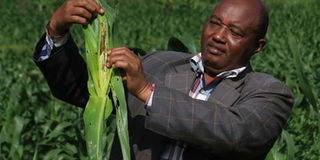Nyeri to spend Sh8.4m to manage worm invasion

Nyeri South Agricultural officer Ruffas Mwangi inspects maize infested by armyworm at Karima on June 8, 2017. He said the spread of the pest must be contained adequately. PHOTO | JOSEPH KANYI | NATION MEDIA GROUP
What you need to know:
- The pest is currently ravaging crops in Othaya, Nyeri Central, Mathira East and Tetu sub counties.
- Farmers have been advised to use only recommended pesticides.
The control of the spread of the fall armyworm in Nyeri County will cost Sh8.4 million, Agriculture executive Robert Thuo has said.
Mr Thuo said 225,000 bags valued at Sh675 million risk being destroyed should the situation persist.
"Urgent measures should be taken to control further spread of the pest because it has the potential to cause 100 per cent loss of crops," he said.
ASSISTANCE
The pest is currently ravaging maize, wheat, cabbages, onions, tomatoes and onions in Othaya, Nyeri Central, Mathira East and Tetu sub counties.
As a counter measure, Mr Thuo has appealed to the national government to assist in eradicating the pest.
"Given the emergency and lack of budgetary support we have done a formal request to the national government to help us in buying equipment, chemicals and mobility," he said.
"The worst is yet to come. It should be declared a national disaster."
DISASTER
Nyeri South Agricultural officer Ruffas Mwangi said the pest is at its last stage of metamorphosing into a moth.
"The damage is not as severe but we fear it will spread further, especially after multiplication," he added.
The adult moth is mostly active at night and can fly 35 to 100 kilometres per day.
PESTICIDES
The fall armyworm was first detected in Trans Nzoia in March this year on off-season irrigated maize.
Farmers have been advised to use only recommended pesticides (such as duduthrin, Fastc and Belt).
"We are also calling on our farmers to restrict movement of infested plant materials to other areas to curb its spread," he said.
The agriculture officer said extension officers will sensitise farmers on pest identification and monitoring, advising them to diversify with traditional high value crops such as sweet potatoes.





